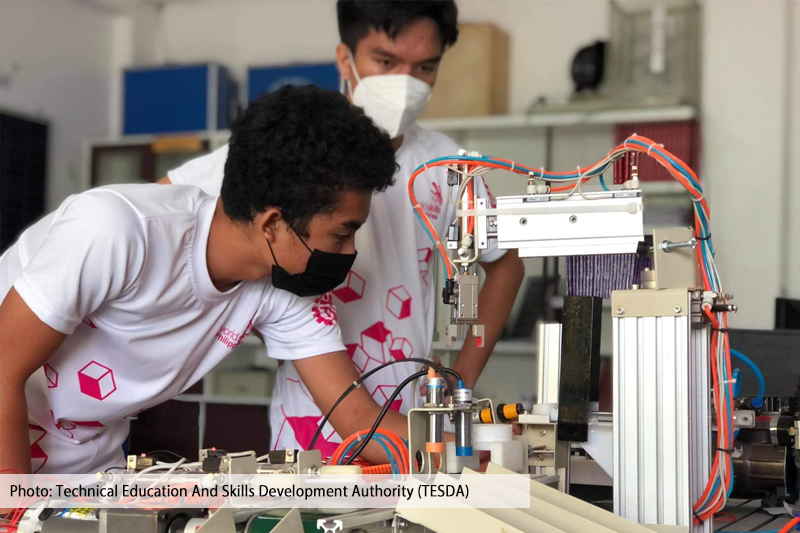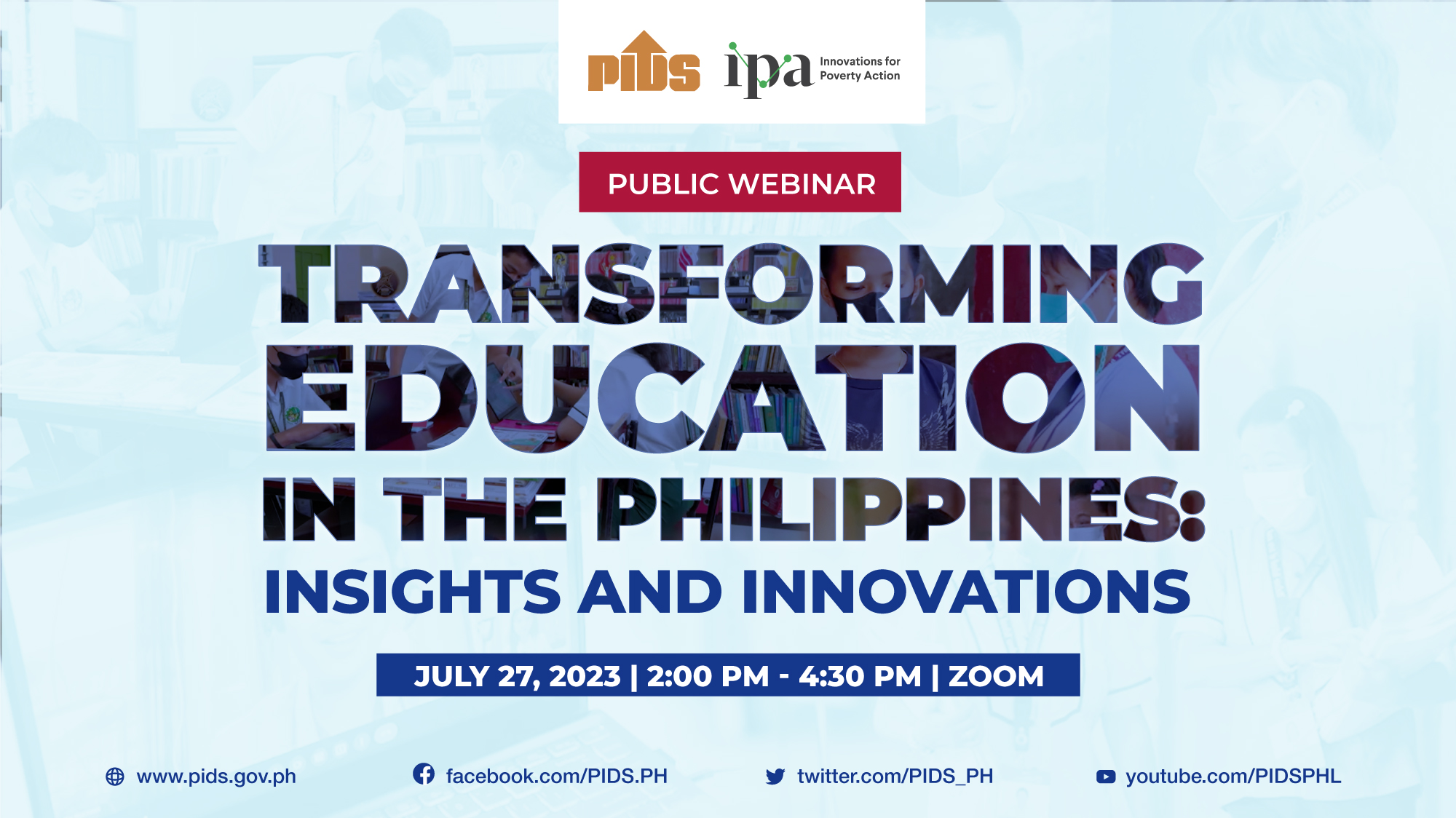A group of prominent economists and socio-political thinkers vehemently opposed proposals to mandate state universities and colleges (SUCs) to offer tuition-free education, arguing that while “well-intended,” such a policy would be “anti-poor.”
In a press statement issued on Tuesday, advocacy group Foundation for Economic Freedom (FEF) instead pushed for the implementation of an existing law that unifies and rationalizes all modalities for student financial assistance, including scholarships, grants-in-aid and student loans.
FEF said the proposal to increase funding for free tuition to SUCs would benefit higher-income students and provide unfair competition to private institutions which are more efficient in providing higher education.
Providing P8.3 billion to SUCs for free tuition is “anti-poor” because this considers only tuition in the cost of higher education, FEF said.
“Tuition covers only one-third of the cost of attending college. The balance consists of cost of living allowances, which the poor are in no position to pay. Higher income students who have the ability to pay for these living allowances will end up using the free tuition subsidy,” FEF said.
FEF also argued that enrollment in SUCs was already highly favorable to higher income students.
The group quoted a research by FEF fellows Aniceo Orbeta and Vicente Paqueo who cited – based on the 1999 and 2014 Annual Poverty Indicators Survey – that the bulk of students in public higher educational institutions were mostly from higher income groups while students coming from the bottom 20 percent consisted of only 11 percent in 1999 and 12 percent in 2014.
“Students from poor families are only a small proportion of SUCs’ student population because they can hardly pay for the full cost of attending college which not only consists of tuition, but board and lodging expenses as well. They are also less prepared academically to pass the entrance exams and pass the academic requirements of four-year college courses,” FEF argued.
“Increasing the budget for free tuition will intensify the exodus of higher income students from private educational institutions toward SUCs and further worsen the proportion of poor students attending SUCs. Higher income students who are more academically prepared will capture the benefits of free college education.”
FEF also feared that the allocation of P8.3 billion for free college tuition would hurt private higher education institutions by creating unfair competition. It added that private higher educational institutions were not in a similar position of being able to offer free tuition from taxpayer pesos.
As an alternative, the group instead proposed that the government channel funds to implement the Unified Student Assistance System for Tertiary Education (UniFAST), enacted into law through Republic Act No. 10687.
Signed into law by then Pres. Benigno Aquino in 2015, this piece of legislation provides a comprehensive and unified financial assistance system to tertiary students in the Philippines. This was meant to give qualified and disadvantaged students access to scholarships and other forms of financial support without the patronage of politicians.
“It also doesn’t favor SUCs over private higher educational institutions as the assistance is given to the student and not the school,” FEF said of the UniFAST law.
“Targeting the poor with full financing using grants-in-aid under the Uni FAST law will clearly benefit more poor students than an untargeted general tuition subsidy for students of SUCs,” the FEF said, quoting fellows Orbeta and Paqueo. Sen. Bam Aquino, who chairs the Committee of Education in the 17th Congress, is the proponent of a bill seeking to make tertiary education in all SUCs free for all students.
Citing data submitted by the Philippine Association of State Universities and Colleges, Aquino said on Tuesday that up to 77 percent of students from majority of SUCs come from a family earning minimum wage income or less.
“They may not be the poorest of the poor, but many of them still come from families of minimum wage earners that need help to cover major expenses like tuition fees,” Aquino argued.
“It’s unfortunate that some groups fail to see the value of this policy. But many of us in the Senate believe this is a step in the right direction,” he added.
FEF, an advocacy group for good economic governance and market-friendly reforms, is chaired by former Finance Secretary Roberto de Ocampo. Its vice chair is Romy Bernardo while the president is Calixto Chikiamco. Its senior advisers are former Prime Minister/Finance Minister Cesar Virata and UP Economics Professor Emeritus and former Economic Planning Minister Gerardo Sicat. Board members include Anthony Abad, Art Corpuz, Eduardo Gana, Felipe Medalla, Vaugh Montes, Simon Paterno, Perry Pe and Gloria Tan-Climaco.//
In a press statement issued on Tuesday, advocacy group Foundation for Economic Freedom (FEF) instead pushed for the implementation of an existing law that unifies and rationalizes all modalities for student financial assistance, including scholarships, grants-in-aid and student loans.
FEF said the proposal to increase funding for free tuition to SUCs would benefit higher-income students and provide unfair competition to private institutions which are more efficient in providing higher education.
Providing P8.3 billion to SUCs for free tuition is “anti-poor” because this considers only tuition in the cost of higher education, FEF said.
“Tuition covers only one-third of the cost of attending college. The balance consists of cost of living allowances, which the poor are in no position to pay. Higher income students who have the ability to pay for these living allowances will end up using the free tuition subsidy,” FEF said.
FEF also argued that enrollment in SUCs was already highly favorable to higher income students.
The group quoted a research by FEF fellows Aniceo Orbeta and Vicente Paqueo who cited – based on the 1999 and 2014 Annual Poverty Indicators Survey – that the bulk of students in public higher educational institutions were mostly from higher income groups while students coming from the bottom 20 percent consisted of only 11 percent in 1999 and 12 percent in 2014.
“Students from poor families are only a small proportion of SUCs’ student population because they can hardly pay for the full cost of attending college which not only consists of tuition, but board and lodging expenses as well. They are also less prepared academically to pass the entrance exams and pass the academic requirements of four-year college courses,” FEF argued.
“Increasing the budget for free tuition will intensify the exodus of higher income students from private educational institutions toward SUCs and further worsen the proportion of poor students attending SUCs. Higher income students who are more academically prepared will capture the benefits of free college education.”
FEF also feared that the allocation of P8.3 billion for free college tuition would hurt private higher education institutions by creating unfair competition. It added that private higher educational institutions were not in a similar position of being able to offer free tuition from taxpayer pesos.
As an alternative, the group instead proposed that the government channel funds to implement the Unified Student Assistance System for Tertiary Education (UniFAST), enacted into law through Republic Act No. 10687.
Signed into law by then Pres. Benigno Aquino in 2015, this piece of legislation provides a comprehensive and unified financial assistance system to tertiary students in the Philippines. This was meant to give qualified and disadvantaged students access to scholarships and other forms of financial support without the patronage of politicians.
“It also doesn’t favor SUCs over private higher educational institutions as the assistance is given to the student and not the school,” FEF said of the UniFAST law.
“Targeting the poor with full financing using grants-in-aid under the Uni FAST law will clearly benefit more poor students than an untargeted general tuition subsidy for students of SUCs,” the FEF said, quoting fellows Orbeta and Paqueo. Sen. Bam Aquino, who chairs the Committee of Education in the 17th Congress, is the proponent of a bill seeking to make tertiary education in all SUCs free for all students.
Citing data submitted by the Philippine Association of State Universities and Colleges, Aquino said on Tuesday that up to 77 percent of students from majority of SUCs come from a family earning minimum wage income or less.
“They may not be the poorest of the poor, but many of them still come from families of minimum wage earners that need help to cover major expenses like tuition fees,” Aquino argued.
“It’s unfortunate that some groups fail to see the value of this policy. But many of us in the Senate believe this is a step in the right direction,” he added.
FEF, an advocacy group for good economic governance and market-friendly reforms, is chaired by former Finance Secretary Roberto de Ocampo. Its vice chair is Romy Bernardo while the president is Calixto Chikiamco. Its senior advisers are former Prime Minister/Finance Minister Cesar Virata and UP Economics Professor Emeritus and former Economic Planning Minister Gerardo Sicat. Board members include Anthony Abad, Art Corpuz, Eduardo Gana, Felipe Medalla, Vaugh Montes, Simon Paterno, Perry Pe and Gloria Tan-Climaco.//












